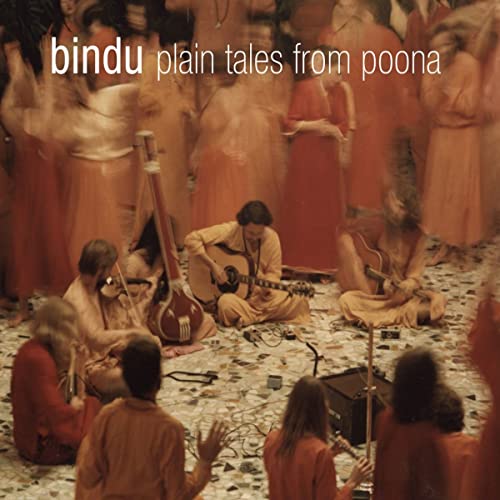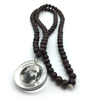Plain Tales from Poona

Madhuri reviews Bindu’s latest CD.
Of course all musics belong to all peoples – the Earth is one – but it can be startling to hear the radio in an Italian house-renovation site blasting out Woolly Bully by Sam the Sham and the Pharaohs. So when I heard the first Johnny-Cash-like, Country strains of Skyline of Poona on Bindu’s new CD, I was surprised – but only for a moment, while my mind was struggling to fit Nashville and India on the same page. And immediately I also felt a wild rightness to it; and the music pulled me in like a crocodile swiftly tugging a river-strolling critter under, and I was hooked.
In just that one opening number, Bindu rolls effortlessly through several Country greats’ styles – or so it seemed to my (admittedly untrained) ear. And he does it in inimitable Bindu style: witty, iconoclastic, drily individualistic…and deeply felt.
I see the skyline of Poona,
Approaching in the dark
From Monkey Hill, Lonavala…
We’re headin’ for the Park….
I don’t know if Bindu listens to much Country; I somehow think he doesn’t – so this is not an imitation; it is Bindu’s own Country soul coming up naturally, like a daisy in Tennessee meadow – in the middle of 17, Koregaon Park! And yet there’s enough tongue-in-cheek in the man to lift us on a wave of laughter too. He’s a dark horse – we’re maybe being taken for a ride – but what a ride!
And here’s the real thing about this album: the musicianship is stunning. Mature, fluid, varied – as expert as expert can be, comprising the gifted contributions of several players, and yet in the service of the wily, innocent, observing heart of one lone human. Bindu’s voice has the authority of ripe experience, and fits under the higher, younger voices of the female backup vocalists like a truck-bed under a load of forget-me-nots. (Aneesha’s in there somewhere but I couldn’t tell which one she was.) And there are a great many instruments involved in this chocolate-box of goodies: I hear mandolin, sax, mouth-harp, guitar of course, and more. Each is at the top of its game, and melds with lush ease with the others. It’s all as smooth as the best sweet-spicy, buffalo-milk-rich chai in a hot little cup you ever had. And it’s not just Country – plenty of other styles ribbon in and do their turn-and-turn-about.
Plain Tales From the Raj is the title of a volume of short stories that was knocking around the commune – I read it and loved it too; it contains stories by Rudyard Kipling, Rumer Godden, and many other writers. Bindu has brought the ‘Plain Tales’ concept into our own little historical archive and has done himself proud. Here are songs called The Ashram (which rocks from Elvis to boogie-woogie, with lots in between, lit up by the light and dancing backup…)
5 o’clock is Kundalini time,
Shake it baby, get outta your mind…
6:45, Darshan gets close
Maneesha’ll sniff ya,
She’s got a fine little nose….
Then there’s Mobos Hotel – which sounds like a song about Texas – a melancholy ballad with a simple, strumming guitar, and a bit of Dylanesque mouth-harp. There’s Cloth Boy – jazzy and bluesy – about the kid at Madhuban Restaurant with his filthy table-and-floor-wiping cloth. There’s German Bakery, and Hey Rickshaw-Man, and M.G. Road – and so on for thirteen tracks.
Plain Tales from Poona has a pleasing cover – an old sepia-brown photo of a Music Group darshan, the musicians in a circle, bent over their instruments, on the randomly-patterned marble floor; a blur of orange-clad dancers behind them. There are more old Poona pictures inside: a rickshaw, Center Street, the Poona skyline, a portrait of Bindu, young and bearded. The burning ghats. Only Bindu, I think, could have done this – because he is rare in his daring to include in his spirituality the wildly-spiritually-incorrect.
Said Vincent Van Gogh, “The best way to know God is to love many things.” Bindu has two sides to his nature: the Rebel, the Protester – and he has albums of protest songs; this is natural and right for him, to contest the status quo (I’m referring to his Human Design here!) And then there’s the passionate, moody, profoundly romantic musician who knows only a timeless swoon of sound – the sound before the sound, trying to come through. He is one who can translate the waves we’re all made of into delicate, defining, always-slipping-away shapes; siphoned through the very essence of individual perception – that lonely, wondering thing. “It is the addition of strangeness to beauty that constitutes the romantic character of art,” says Walter Pater. In his wry eye for the strange, and in his own way, Bindu is showing his love for this India who belongs to all of us who’ve visited her, and for the particular history which belongs to we relatively few who have lived it. The pye dog, the rickshaw man…and the Man, who is not left out, no not at all.
Darshan’s over, now it’s getting’ late
You’ve been meetin’ the Man,
Now it’s time for the date.
But this 50’s rhyme-slinging is just a merry way to refer to that which we all have in us as our breath and bones; He who inhabited the empty center of that circle of musicians. By describing the spokes of the wheel, Bindu does not insult the axle.
German Bakery sounds first like 50’s rock, then Zydeco. I was struggling to think what all these sounds were reminding me of, so fast did they glide and open and wail and transform to something else – but what I can say is that the celestial, divinity, is just stuffed into the gorgeous, flawless mastery in the music.
This is not an airbrushed Poona. Bindu doesn’t do airbrushing. This is the raunch and hurdy-gurdy of everyday life in a place that was never everyday. “There is no ‘must’ in art because art is free,” says Wassily Kandinsky. The song Doggo is typical of this; rollicking rock ‘n’ roll with a good, catchy beat – a song about a mangy street-dog, beautifully-sung, sort of Hawaiiany too, so that by the end, though I’d started with Buddy Holly, I ended up in an Oahu bar. A mix of musical styles rather like the flow of traffic on an Indian road: truck, rickshaw, bullock cart, bicycle, cow, dog.
I am reminded too of this wonderful song from the Eskimaux of Northern Canada:
I have grown old, I have lived much,
many things I understand,
but four riddles I cannot solve
Ah-ya-ya-ya
The sun’s origin, the moon’s nature,
the minds of women, and why people
have so many lice –
Ah ya-ya-ya
Bindu, like all of us, is ageing – but as his physical vision dims his musical vision tautens, brightens, and expands…If we were a nation, he is a national treasure; appreciate him while you can.
And now – a little Protest of my own – for I’ve some of that piece of wiring too; just some –
When, sometime after Osho left his body, the musicians were told they had to work six hours – whether at music or something else, as long as it was six – and many left in disgust (for musicians are always working; it just might not look like it to people who have certain ideas what work is)…a great loss was dealt to us all. It was the only one of the changes in those years that really bothered me. There is a Sufi saying, “God respects us when we work but loves us when we dance.” To have bards lounging about in the gardens plucking guitars is one of the greatest privileges of a human community (Yes, even that German guitarist who practiced Eleanor Rigby under my Pyramid window all day every day for what seemed like weeks!)
Musicians are special beings. I once had occasion to do chakra readings for most of the orchestra in Lyon, France, and I was astonished at what I saw; that sheer variety of individualism was not there in the normal mix of the population. Each had his or her own opening to some further place, some rhythmic yet timeless domain quite separate from scheduled city life; and having no resemblance to the unique doorway of the fellow he might be playing next to in the orchestra pit. Musicians listen to what all of us need to hear, and bring it back for us on gilded platters. They help us lift our knees and twitch our toes and laugh out loud, sing and weep and love one another – because in music we drink from the spring where romance flows from. (There’s a lovely picture in the Album Notes called Lovers in the Rain, of the backs of two robed figures walking hand in hand under massive, drooping banyans.)
In reading Dylan’s Chronicles and Keith Richard’s Life I see again how musicians live and eat and breathe and dream music – that is the name of their country – and we cannot and should not control them. Let them sing the commentary to our own bizarre fate in finding ourselves on this crazy planet, in these hallowed, glitch-prone bodies, with these exquisite, solitary sensitivities assailing us, welcome or unwelcome….We need musicians to prevent life becoming a dry husk of itself; and we need to realize that musicians don’t need our schedules and our laws. Their own laws are benign; there is nothing to fear there – only more and more beauty to be revealed by what their fingers can do amongst the strings.
The last two tracks wind down to something slower, more plaintive; and both are about leaving:
I’m goin’ back home
To my boring Western home
about the sorrow of leaving when your lungs can’t take the bad air; that’s Challo. And
No, I’m never gonna do it again
Take the bus to Goa!
In Bus to Goa. I was missing the rock ‘n’ roll, the vivid, sexy joy in the other pieces – till I realized that they are simply true to the mood of leaving: for I certainly never wanted to leave the party without a ticket back right there in my hand. That tearing sigh when you were about twenty miles out of town – “Now I’m gone. I’ve really left.” That moment can’t be celebrated with rock ‘n’ roll.
Madhuri, Osho News
The album is available:
download from iTunes
download album or individual songs: www.amazon.com – www.amazon.co.uk
buy CD online (approx. 15 EUR): www.gatewaymusicshop.dk
Below, in the video, a taster of the album:
Bindu, born in Copenhagen, studied anthropology at Uni before dedicating his life to music. He heard about Osho in 1977 and immediately felt called to go to Poona, where he took sannyas in the autumn of that year. He’s been a professional musician since the mid-80’s, and has released 12 CDs with various kinds of music. Bindu travelled the world for 25 years and now lives in Copenhagen. amazon.com
- Log in to post comments
- 20 views
